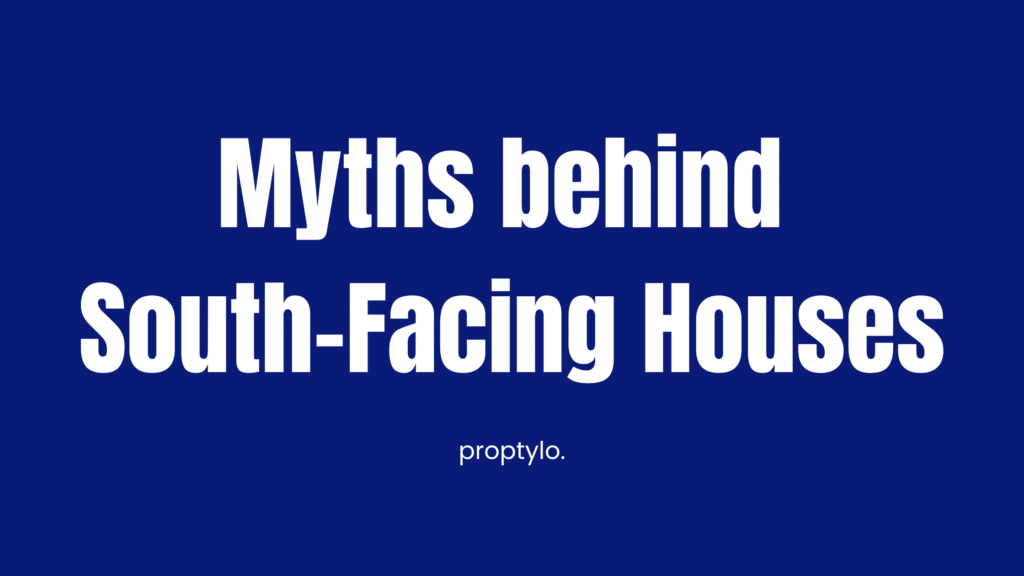
Let me separating facts from fiction today, once for all!
When it comes to buying a home in India, one topic that sparks endless debate is the direction of the house — and south-facing houses often get the most criticism. Many people believe that south-facing homes bring bad luck, poor health, or financial troubles.
But is there any truth to these claims? Or are they just centuries-old myths that need a reality check?
Let’s dive deep into the myths behind south-facing houses and uncover what Vastu Shastra really says.
Myth 1: South-Facing Houses Are Always Bad
This is the most common belief — that any house facing south is inauspicious and should be avoided at all costs.
Fact: In Vastu Shastra, no direction is inherently bad. Each direction has its own set of energies and characteristics. A south-facing house can be highly beneficial if the layout, entrance, and room placements follow Vastu principles. In fact, south-facing homes are often recommended for people in leadership roles, politics, or business, as the south direction is associated with fame, recognition, and authority.
Myth 2: South-Facing Means Yama’s Direction (God of Death)
In ancient Hindu scriptures, the south is considered the direction of Yama, the god of death, which led to a deep-rooted cultural fear.
Fact: This association is symbolic and was never meant to be taken literally for home construction. The “direction of Yama” concept was part of a larger philosophical teaching about life cycles — not a housing ban. Over time, this symbolism got misinterpreted as a practical restriction, giving south-facing houses an undeserved bad reputation.
Myth 3: South-Facing Houses Bring Financial Loss
Many people believe that living in a south-facing home leads to constant financial struggles.
Fact: Financial issues are not caused by the house’s facing direction alone. Problems occur when key elements like the main entrance, kitchen, bedroom, or water sources are placed incorrectly according to Vastu. A south-facing home with its main entrance in the southeast zone, a strong southwest corner, and open north and east zones can actually attract wealth and stability.
Myth 4: South-Facing Houses Are Hot and Uncomfortable
It’s true that in India, the sun’s path is towards the south, so south-facing homes receive more direct sunlight, especially in winter. Historically, this made them warmer than other homes.
Fact: This “problem” is actually an advantage in many modern scenarios. Extra sunlight means natural brightness, lower electricity bills, and a healthier living environment. With today’s architecture, insulation, and ventilation systems, the excess heat can be easily managed — turning this so-called drawback into a benefit.
Myth 5: South-Facing Houses Are Not Good for Families
Some people claim that south-facing houses create disharmony among family members or bring health issues.
Fact: These problems are not direction-specific. Vastu attributes harmony and well-being to correct room placement, ventilation, and energy flow. A well-planned south-facing home with a master bedroom in the southwest, a kitchen in the southeast, and a living room in the north or east can foster peace and good health.
Why the Myths Persist
These myths have survived for generations due to:
Cultural storytelling: Fear-based advice from elders to prevent mistakes.
Half-understood Vastu rules: People focus on direction alone without considering the entire layout.
Past limitations: In older times, heat control and ventilation were harder to manage, so south-facing homes were less preferred in tropical climates.
When South-Facing Can Be a Problem
While the direction itself is not bad, issues can arise if:
The main door is placed in the southwest (considered inauspicious in Vastu).
The north and east sides are blocked or heavily built-up.
Heavy structures or septic tanks are placed in the wrong zones.
How to Make a South-Facing House Vastu-Friendly
If you already own or are considering buying a south-facing home, here are some Vastu-friendly tips:
- Place the main entrance in the southeast part of the south wall.
- Keep the north and east zones open and well-lit.
- Place the master bedroom in the southwest.
- Position the kitchen in the southeast.
- Use Vastu remedies like mirrors, plants, and metals to balance energy if structural changes aren’t possible.
The Truth in a Nutshell
A south-facing house is not a curse. In fact, when designed properly, it can be extremely auspicious. The real key is layout planning — not blindly following the fear of a particular direction.
So, the next time someone warns you about a south-facing property, remember: it’s not the direction, but how you use it that determines the energy of your home.
Final Thought
Vastu Shastra is a science of balancing energies — and like any science, it should be applied with understanding, not superstition. A south-facing house, when aligned with Vastu principles, can be just as lucky and prosperous as any other.
